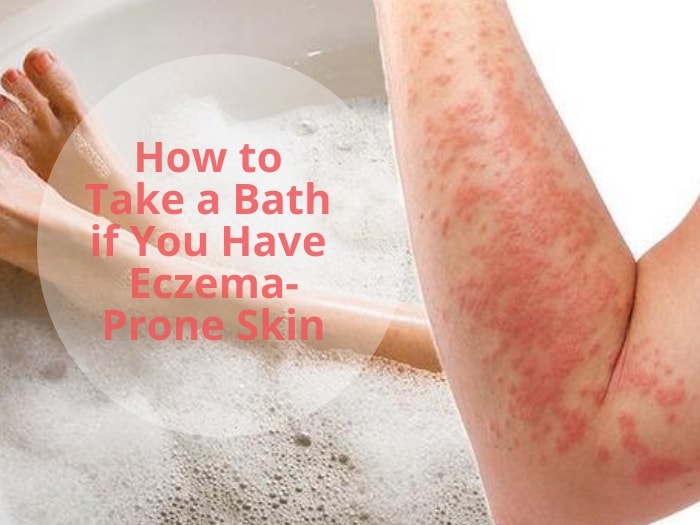For many, taking a shower is a perfect start of the morning, along with combing their hair and brushing the teeth, but there are many individuals who don’t shower every day. If you have eczema then you need to maintain proper hygiene conditions.
There are much conflicting studies on how often and how to take a bath if you have eczema. It’s possible that your daily shower is actually too much for your eczema skin. There are many types of bath solutions to treat the symptoms of eczema.
Preventing flareups is a tricky part. There are various types of eczema, but the most common is atopic dermatitis or AD, that is allergy-related. The irritants include some food or environmental allergens, irritating soaps or detergents, tight or synthetic clothing, cold or dry air, stress, and sweat.
It may sound counterproductive, but taking a shower daily could affect your skin badly. Some dermatologists only recommend a shower every other day, or two to three times a week.
Many people hit the shower at least once a day, either in the morning or at night before bed; so, setting up a good skin care routine that includes daily bathing and moisturizing the skin is very important for managing eczema symptoms and preventing eczema flare-ups.
The best way to replace moisture in the skin is to soak your body in a bath or take a shower and then moisturize will immediately after having a shower.
 Soak And Seal Method To Treat Eczema:
Soak And Seal Method To Treat Eczema:
It is one of the best-recommended methods by dermatologists to reduce eczema flares and combat dry skin conditions. Follow the below-listed steps:
- Fill your bathtub with a lukewarm water
- Use a mild cleanser free of fragrances, chemicals and avoid scrubbing
- Pat dry your skin after taking a bath
- Apply the medication to the affected areas as directed by your doctor
- Within a few minutes apply moisturizer all over the body. It is recommended to apply moisturizer within 3 minutes or the skin may become dry.
- Wait till the moisturizer is absorbed properly to the skin before applying wet wraps or dressings.
* Use of loofah or washcloth shall be prohibited as the scrubbing motion can worsen the skin condition. So, just soak your body and avoid any additional products.
Is a bath or shower better for my eczema?
If you shower too much it can lead to discomfort, and you may experience:
- Itch
- Dry and flaky skin
- Eczema flareups
- Brittle and dry hair
Showering too often can affect the skin’s natural barrier, called the acid mantle. This acid mantle is slightly acidic in nature. So, taking shower daily with alkaline soap or washes, can change the pH of your skin and leave your skin more itchy, dry and susceptible to bacterial or viral invasion.
If you don’t bath every day the dead skin can stick to your skin, this may be responsible for hyperpigmentation. It can also increase:
- body odor
- Eczema flare-ups
- Acne
- Skin Infections
- areas of dark skin
- Thick patches of scaly skin
However, too much contact with water or improper bathing techniques can be responsible for skin irritation.
Is Soaking in Epsom salt good for eczema?
Epsom salt (magnesium sulfate) is a pure, time-tested mineral compound
Epsom salt (magnesium sulfate) is a pure magnesium and sulfate mineral compound derived from distilled water. Although its not scientifically proven but according to review of research it was concluded that Epsom salt baths can be used to relieve the symptoms of eczema.
It’s still unclear if Epsom salt provides relief from eczema symptom, or if the bath simply has a placebo effect.
That being said, various types of Baths solutions for eczema — including bleach bath, oatmeal bath and Epsom salt bath — can be soothing and relaxing for an eczema prone skin.
Is bleach bath good for eczema?
Eczema is an itchy, flaky and irritated skin condition that makes your skin dry. Bleach baths can be a real savage. A small amount of bleach when added to lukewarm water may help reduce the symptoms of atopic dermatitis.
These eczema bleach baths act as antibacterial bath solutions that help kill bacteria on the skin, thus reducing flaky, dry and itchy skin condition. Few individuals apply hypoallergenic lotion to lock in the moisture after bath.
Is bleach bath safe for children?
A bleach bath is safe for both children and adults though you should be much aware of the possible risks and safety procedures while soaking yourselves or your children in a bleach bath.
The bath solution works effectively when combined with other eczema treatments, like moisturizer and medications as per the doctor’s recommendation for improving eczema symptoms by killing harmful bacteria on the skin.
It is advisable to use non-concentrated household bleach, that possesses 5.25 percent sodium hypochlorite. Dilute and use the mixture as directed to see better results.
*For a baby or toddler bath, use 1 teaspoon of bleach per gallon of water.
How much bleach can you put in your bath water?
Mix approximately ¼ – ½ cup non concentrated bleach into a bathtub full of lukewarm water (40 gallons). Soak yourselves for about 10 minutes in the diluted bleach bath solution and avoid the use of washcloth or loofah to yield better results.
You can have a bleach bath for three times per week. Pat dry the skin. Apply moisturizer within 3 minutes to lock in the moisture inside your skin and keep it hydrated. Wear cotton and lose clothing to stop itchiness and redness.
 Tips for bathing and moisturizing :
Tips for bathing and moisturizing :
Let’s know some tips and techniques that prove to be beneficial when bathing with eczema prone skin:
- Shower once a day
- Bathe or shower in lukewarm (not too hot nor too cold) water for approximately 10 to 15 minutes
- Avoid scrubbing your skin with a loofah
- Use a mild fragrance-free cleanser
- If irritation exists, limit the use of cleansers
While moisturizing your body just remember to
- Use a moisturizer twice a day to improve hydration
- After washing your hands, moisturize it regularly
- Schedule your bathing and moisturizing routine at night as this routine can be beneficial to retain skin moisture
 Using Essential oils while taking a bath
Using Essential oils while taking a bath
Hot Bath:
Add few drops of chamomile, geranium and lavender oil to a bathtub filled with lukewarm water. Soak yourself for 10-15 minutes. Ensure that you add the oils after filling the tub with lukewarm water.
Lavender Spray:
To avoid skin irritation and inflammation, you can prepare a lavender spray for yourself. Mix 10-15 drops of the oil in 1 cup of distilled water to make a dilute solution. Add it to your spray bottle and shake it well before its application.
Eczema Lotions
You can prepare your own eczema lotion by adding 20-25 drops of any essential oil to 8 ounces of lotion. Preferably look out for a lotion that is natural, unscented and has Vitamin E and Shea butter.
Before applying essential oils on the affected area, a patch test is recommended to ensure that you are not allergic to it. Also, consult your dermatologist regarding your current condition and the oil that you are attempting to use to avoid any skin irritation.
 Bath Treatments for Eczema Prone Skin:
Bath Treatments for Eczema Prone Skin:
Bleach Baths:
The bath is helpful to decrease the bacterial infection on the skin.
- Take a half cup household bleach for a full bathtub, one-fourth cup for a half bath,
- Soak yourselves for about 10 minutes and rinse off.
- Use this method 2-3 times a week.
- Pat dry your skin gently and moisturize well to lock in the moisture.
Oatmeal Baths For Eczema:
Oatmeal Bath is used to decrease skin irritability.
- Mix one cup of grounded oats in a bathtub filled with lukewarm water till the water becomes milky in texture.
- Add a few drops of essential oils into the bathtub
- soak yourselves for approx 20 minutes.
- Pat dry your skin
Oatmeal particles on the skin to proceed with the action of healing. Moisturize the skin.
Magnesium Baths:
Magnesium helps to ease the eczema conditions. Be careful as it is seen that in a few cases the condition worsens as soon as the patient comes in contact of water. For rest, you can
- add 2 cups of Epsom salts with 1 tbsp of pure vanilla extract and 8 drops of mint oil.
- Soak yourselves for 20 minutes, and more to get your skin healed up slowly.
Also Read: Top 10 Baths Solutions For Eczema
Apple Cider Vinegar Baths:
The vinegar possess antibacterial, antifungal action and reduces the microbes on your skin making it more moist and soft. Apple Cider vinegar helps to boost your immune system and further reducing your skin irritability.
- Add 2 cups of vinegar into water-filled bathtub.
- Soak yourselves for about 15 minutes and feel the difference with your skin.
- Pat dry your skin gently.
- Avoid scrubbing.
Also Read – Apple Cider Vinegar for Eczema
Essential Oil Baths:
Oils in your bath can do wonders for your skin. Taking an oil bath no doubt leaves your skin soft and moist but also there’s a huge risk of getting slipped so be careful while taking oil bath.
Eczema is a complicated skin condition that may be related to other conditions such as food allergies and asthma; so it requires expert advice and treatment to manage the skin condition appropriately.
Also read – Best Essential Oils for Eczema Care
It is recommended to visit your doctor as soon as you notice any symptoms or a particular set of eczema triggers as they can develop an eczema management plan or could further opt for an elimination diet plan for eczema based on the individual needs.
Each and every individual is different so their eczema symptoms may vary. In order to manage the condition; expert analysis, evaluation, and a targeted plan can do wonders for the skin.
Sources:





